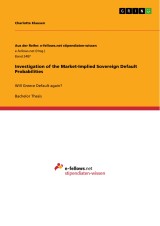Details

Investigation of the Market-Implied Sovereign Default Probabilities
Will Greece Default again?1. Auflage
|
18,99 € |
|
| Verlag: | Grin Verlag |
| Format: | |
| Veröffentl.: | 26.07.2017 |
| ISBN/EAN: | 9783668492806 |
| Sprache: | englisch |
| Anzahl Seiten: | 49 |
Dieses eBook erhalten Sie ohne Kopierschutz.
Beschreibungen
Bachelor Thesis from the year 2015 in the subject Business economics - Investment and Finance, grade: 12/12, Copenhagen Business School (Department of Finance), language: English, abstract: This thesis investigates the default probabilities of market-implied sovereign default probabilities by using credit default swap (CDS) spreads and conducts an analysis of the spreads’ determinants. Building on the no-arbitrage pricing model of CDS, the probabilities for Greece defaulting within the next five years from today is approximately 75%, assuming a recovery rate of 25%. Against economical intuition, the results provide a positive correlation between the recovery rate and CDS spreads.
A comparison of Greece’s default in 2012 with its default probabilities indicates that spreads closer to 2012 are much higher, hence imply higher default probabilities and therefore capture the default accurately. Though, spreads taken exactly T years before the default provide vague, i.e. very low default probabilities.
The regression analysis provides different results for the determinants of spreads of either country, though in neither model all variables are statistically significant individually, e.g. Greece’s spreads can solely be explained by the country specific factor, the unemployment rate. The unexpected negative effects of FX on the spreads could be an indicator of a cracked Eurozone.
Further, the analysis of today’s actual vs. the regression’s predicted spread indicates an overestimation of the predicted spreads of Greece, Italy, Germany and France, where Greece’s absolute difference between the actual and predicted spread by far is the biggest (approx. 7000 BPS). Hence, Greece also seems to be very likely to default from statistical view. Assuming that the statistical model is correct and always overestimates the spreads by a factor of 4.4, then results suggest a potential statistical arbitrage possibility where the arbitrageur would go long in the French spreads and short in the German spreads.
A comparison of Greece’s default in 2012 with its default probabilities indicates that spreads closer to 2012 are much higher, hence imply higher default probabilities and therefore capture the default accurately. Though, spreads taken exactly T years before the default provide vague, i.e. very low default probabilities.
The regression analysis provides different results for the determinants of spreads of either country, though in neither model all variables are statistically significant individually, e.g. Greece’s spreads can solely be explained by the country specific factor, the unemployment rate. The unexpected negative effects of FX on the spreads could be an indicator of a cracked Eurozone.
Further, the analysis of today’s actual vs. the regression’s predicted spread indicates an overestimation of the predicted spreads of Greece, Italy, Germany and France, where Greece’s absolute difference between the actual and predicted spread by far is the biggest (approx. 7000 BPS). Hence, Greece also seems to be very likely to default from statistical view. Assuming that the statistical model is correct and always overestimates the spreads by a factor of 4.4, then results suggest a potential statistical arbitrage possibility where the arbitrageur would go long in the French spreads and short in the German spreads.
Diese Produkte könnten Sie auch interessieren:

Digitale Transformation und Nachhaltigkeit in der globalen Finanzwirtschaft

von: Tim Alexander Herberger

89,00 €















